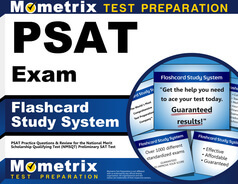Every year, thousands of high school students across the United States prepare to take the SAT. To give students an opportunity to practice for the SAT while simultaneously competing for scholarships based on their performance, the College Readiness Board has created the PSAT/NMSQT (Preliminary SAT/National Merit Scholarship Qualifying Test).
This page covers everything you need to know about the PSAT/NMSQT, such as what information the examination covers, the number and type of questions you can expect, and what score you need to pass.
What is the PSAT?
As mentioned previously, the PSAT/NMSQT is administered by the College Board, the organization that helps high school students prepare for college.
The PSAT/NMSQT, along with several other aptitude tests offered by the College Board, is designed to measure the knowledge and skills of 11th-graders that will be beneficial as they advance through college and further their career.
PSAT Outline
The PSAT/NMSQT contains a total of 98 questions and has a time limit of 134 minutes (2 hours and 14 minutes).
The test is split into two sections:
Reading and Writing
The Reading and Writing test is composed of 54 questions, which are divided into two modules, and you will be given 64 minutes to complete the section. Each question in this section consists of reading a passage and answering a related multiple-choice question. Some questions demand information recall, but most require you to use inference skills and context clues to determine the best answer choice.
The passages range from 500-750 words and are usually from a US founding document, a piece of literary fiction, or a globally relevant work. There are also two passages on either the social sciences or the natural sciences.
This section will evaluate your skills in the following four categories:
- Craft and Structure: This category focuses on your ability to analyze, comprehend, and synthesize text, as well as your reasoning skills and vocabulary knowledge.
- Information and Ideas: This category focuses on your ability to evaluate central details and ideas, make inferences, and wield evidence found in tables, graphs, and texts.
- Standard English Conventions: This category focuses on your text editing skills. Specifically, you will be tested on your knowledge of English sentence structure, usage, and punctuation.
- Expression of Ideas: This category focuses on your ability to revise and improve the effectiveness of a text.
Math
The Math section contains 44 questions, which are divided into two modules, and you will be given a time limit of 70 minutes. You will be able to use a calculator throughout the entire Math section, whether it’s the provided digital calculator or an approved physical calculator.
The questions are grouped into four domains.
- Algebra: This domain focuses on the mastery of linear equations, systems of linear equations, and functions. These questions will evaluate your ability to represent situations through equations and solve them, as well as make connections between different representations of linear relationships.
- Advanced Math: This domain focuses on your skills and abilities regarding absolute value, equivalent expressions, and nonlinear functions.
- Problem Solving and Data Analysis: This domain focuses on analyzing problems and drawing information from data. These questions include using ratios, percentages, and statistical analysis to assess a practical command of math applied to real-world situations.
- Geometry and Trigonometry: This domain focuses on your ability to solve geometric problems. You will be tested on your knowledge of area, volume, circles, right triangles, and lines.
Check Out Mometrix's PSAT Study Guide
Get practice questions, video tutorials, and detailed study lessons
Get Your Study Guide
PSAT vs. SAT vs. ACT
The PSAT, SAT, and ACT are each used to help you get into college, but there are some notable differences among them. Wondering which test is right for you?
Take a look at the details of each exam here:
| Time | ||
|---|---|---|
| PSAT | SAT | ACT |
| 2 hours and 45 minutes | 2 hours and 45 minutes (+50 minutes for Essay section) | 3 hours (estimated) |
| Question Count | ||
|---|---|---|
| PSAT | SAT | ACT |
| 139 questions (estimated) | 98 (mostly multiple-choice questions) | 171 (multiple-choice questions) |
| Section Count | ||
|---|---|---|
| PSAT | SAT | ACT |
| 3 sections | 2 sections | 3 sections (+2 optional sections) |
| Subjects | ||
|---|---|---|
| PSAT | SAT | ACT |
|
|
|
| Test Dates | ||
|---|---|---|
| PSAT | SAT | ACT |
| Annually in October | Dates set by the College Board |
|
| Registration Methods | ||
|---|---|---|
| PSAT | SAT | ACT |
| Registration handled by the school | Online | Online and by mail |
| Fee | ||
|---|---|---|
| PSAT | SAT | ACT |
| $18 (varies based on school or state funding) | $68 | $65: without writing section $90: with writing section |
| Fee Waiver | ||
|---|---|---|
| PSAT | SAT | ACT |
| Yes (for eligible low-income students) | Subject to region | Yes |
| Receive Scores | ||
|---|---|---|
| PSAT | SAT | ACT |
| 50 days (estimated) | 2-4 weeks | 3-8 weeks |
| Pass or Fail | ||
|---|---|---|
| PSAT | SAT | ACT |
| Yes | No | No |
| Time | ||
|---|---|---|
| PSAT | SAT | ACT |
| 2 hours and 45 minutes | 2 hours and 45 minutes (+50 minutes for Essay section) | 3 hours (estimated) |
| Question Count | ||
|---|---|---|
| PSAT | SAT | ACT |
| 139 questions (estimated) | 98 (mostly multiple-choice questions) | 215 (multiple-choice questions) |
| Section Count | ||
|---|---|---|
| PSAT | SAT | ACT |
| 3 sections | 2 sections | 4 sections (+1 optional section) |
| Subjects | ||
|---|---|---|
| PSAT | SAT | ACT |
|
|
|
| Test Dates | ||
|---|---|---|
| PSAT | SAT | ACT |
| Annually in October | Dates set by the College Board |
|
| Registration Methods | ||
|---|---|---|
| PSAT | SAT | ACT |
| Registration handled by the school | Online | Online and by mail |
| Fee | ||
|---|---|---|
| PSAT | SAT | ACT |
| $18 (varies based on school or state funding) | $60 | $69: without writing section $94: with writing section |
| Fee Waiver | ||
|---|---|---|
| PSAT | SAT | ACT |
| Yes (for eligible low-income students) | Subject to region | Yes |
| Receive Scores | ||
|---|---|---|
| PSAT | SAT | ACT |
| 50 days (estimated) | 2-4 weeks | 3-8 weeks |
| Pass or Fail | ||
|---|---|---|
| PSAT | SAT | ACT |
| Yes | No | No |
How to Register
You may take this test on a regular school day between the months of September and April. Your high school will most likely arrange for scheduled testing dates during these months or you may also inquire with your school guidance counselor regarding this matter. The fee for the test materials used is $18, but your high school may also decide to cover these expenses for the students.
Homeschooled students can request to take the test by contacting their local school. For students with disabilities and special testing accommodations, official approval is not needed by the College Board. Students outside the US who want to take the PSAT/NMSQT must contact a local school in their current country at least four months before the exam for ample preparation.
Test Day
What to Bring
There are only a few things that you need to bring with you on the day of the test. The most important things to bring are two No. 2 pencils, an eraser, and an approved calculator.
In addition to these items, students outside the US should be prepared with their US school’s code, their US school’s name and address, and the name and address of the school where they’re taking the test.
What NOT to Bring
The College Board lists the following as items that you are not allowed to bring with you into the testing room:
- Mobile phones, smartwatches, fitness trackers, or other wearable technology
- Audio players or recorders, tablets, laptops, notebooks, Bluetooth devices, or any other personal computing devices
- Separate timers of any type
- Cameras or any other photographic equipment
- Pens, highlighters, or mechanical or colored pencils
- Books or references of any kind
- Compasses, rulers, protractors, or cutting devices
- Papers of any kind, including scratch paper
- Earplugs
- Calculators that have QWERTY keyboards, use paper tape, make noise, or use a power cord
- Weapons or firearms
Scoring
Your overall score is composed of two section scores: your Reading and Writing score (composed of the Reading and Writing Test) and your Math score. The two section scores range from 160 to 760 and both of these sections contribute equally to your total overall score.
Scores are calculated first by whether they are correct or incorrect. When calculating your raw score, the difficulty level and other qualities of the questions, like how easy it is to guess a certain question or how well it can differentiate a person’s skill level, are also taken into account. All students have the same opportunity to demonstrate their strengths, as every test conforms to a standardized specification of question types and qualities.
PSAT Score Range
Your overall score report will show a number in the range of 320-1520. You will also see your score percentile, which is the percentage of test-takers who scored higher or lower than you after taking the test during the same time period. Your score report will also show your specific test scores, cross-test scores, and sub-scores to give you an in-depth look at your academic performance.
This overall score is composed of two section scores: your Reading and Writing score (composed of the Reading and Writing Test) and your Math score.
Check Out Mometrix's PSAT Flashcards
Get complex subjects broken down into easily understandable concepts
Get Your Flashcards
PSAT Online Prep Course
If you want to be fully prepared, Mometrix offers an online PSAT prep course designed to give you everything you need to succeed!
Here’s what you’ll find in the PSAT course:
- 60+ Review Lessons Covering Every Topic
- Over 950 PSAT Practice Questions
- 220+ Video Tutorials
- 450+ Digital Flashcards
- Money-back Guarantee
- Mobile Access
Everyone learns differently, so we’ve tailored the PSAT online prep course to ensure every learner has what they need to prepare for the PSAT exam.
Click below to check it out!

FAQs
Q
When do PSAT scores come out?
A
Your PSAT scores will be available online 4-6 weeks after the test.
Q
What is a good PSAT score for a sophmore?
A
A good PSAT score is above the 75th percentile, or 1060, on average for students. However, any score higher than 1060 is considered to be an excellent PSAT score for a sophomore. Scores above 920 are okay, and those beyond 1180 indicate an outstanding score.
Q
What is the PSAT out of?
A
A perfect PSAT score is 1520, and the minimum score you can get is 320.
Q
What is a good PSAT score?
A
A good score to aim for is anything above 1000. The top 10% of test-takers score between 1250 and 1520.
Q
What is the PSAT?
A
The PSAT/NMSQT is a standardized test used to measure the reading, math, and writing skills of 11th-grade students as they prepare to go into college.
Q
How long is the PSAT?
A
The time limit for the test is 134 minutes, which is 2 hours and 14 minutes.
Q
What does PSAT stand for?
A
PSAT stands for Preliminary SAT (the term “SAT” is not short for anything).
Q
What is the average PSAT score?
A
The average score on the PSAT/NMSQT is 920.
Q
How many questions are on the PSAT?
A
There are 98 questions on the test.
Q
Is the PSAT easier than the SAT?
A
Yes, the PSAT/NMSQT is not quite as difficult as the SAT.
Q
How is the PSAT scored?
A
Your final PSAT/NMSQT score is based on two section scores: the Reading and Writing score and the Math score. Each section score will be between 160 and 760, which means the highest you can score on the PSAT is 1520.
*PSAT/NMSQT is a registered trademark of the College Entrance Examination Board, which was not involved in the production of, and does not endorse, Mometrix Academy.


